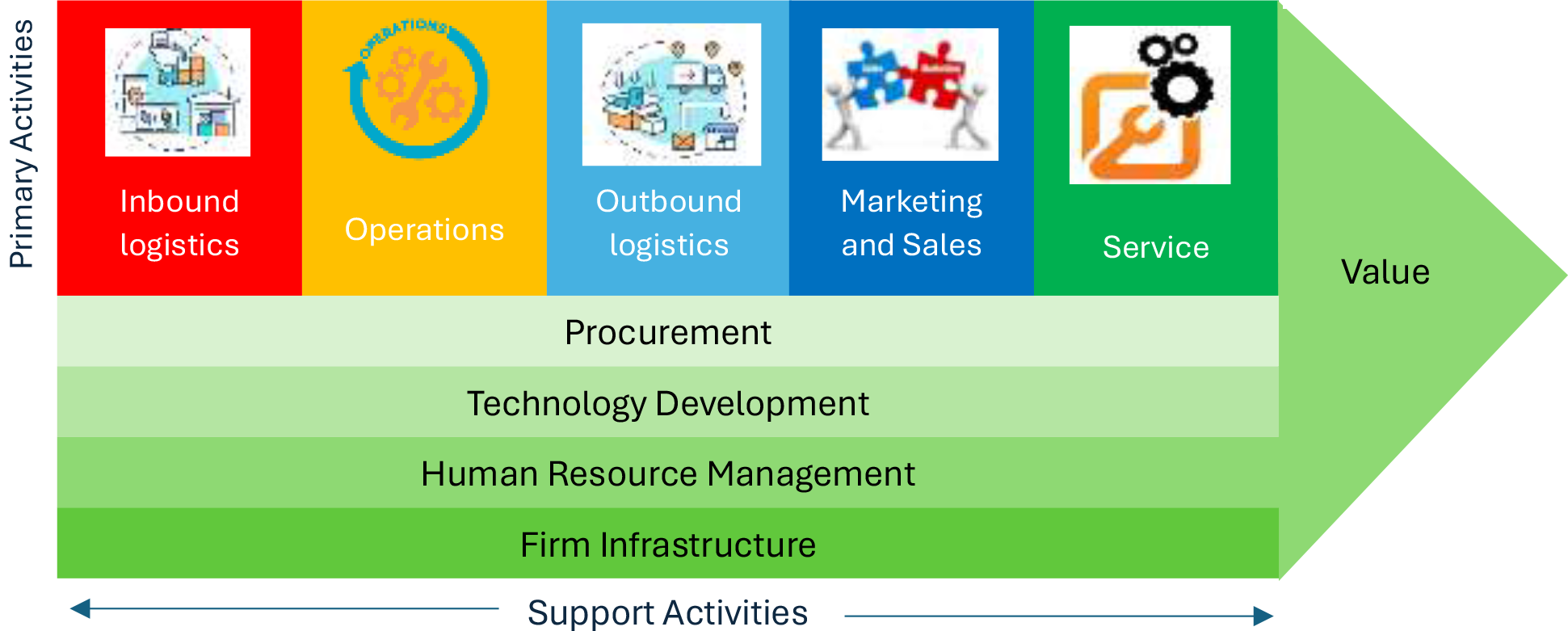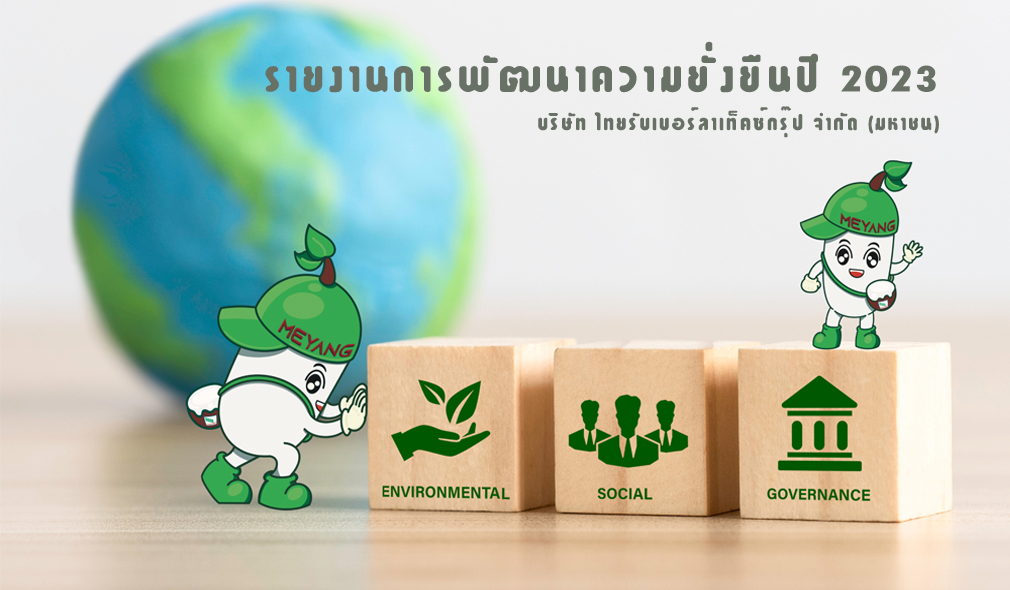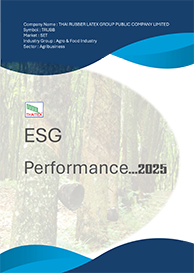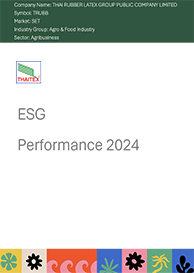Sustainability Policy
Thai Rubber Latex Group Public Company Limited has the intent and determination to develop and drive business towards sustainability by focusing on business operations that take into account the three main areas of responsibility, namely the environment, society and governance (Environmental, Social, Governance: ESG) in accordance with international principles and for the company to adjust and develop the business to be able to survive and grow stably and sustainably under the circumstances that the business has to face problems and challenges in many areas including to create long- term value for the business and create value or benefit to stakeholders. The Executive Committee therefore has established policies and goals for sustainable business operations as a framework and guideline for operations as follows:
- Operate its business sustainably under a good corporate governance system based on honesty, fairness, transparency, openness, accountability and responsibility. There is an important supporting system which consists of risk management, internal control, data communication, inspection and review.
- Uphold and abide by the guidelines and practices set out in the Company Charter and Code of Conduct, including policies related to sustainable development.
- Apply sustainable business concepts and principles in value chain management and relationships with stakeholders throughout the business value chain.
- Establish environmental policies and practices that reflect our commitment to reducing the environmental impact on stakeholders throughout the business value chain.
- Establish social policies and practices that reflect our commitment to doing business with respect for human rights and responsibility to stakeholders, community, and society throughout the business value chain.
- Cultivate awareness and culture of environmental protection and social responsibility towards employees and stakeholders on a continuous and consistent basis.
- Develop and promote corporate innovations and new technologies as business strategies to create added value for the business and long-term growth of the organization.
- Promote and support stakeholders throughout the business chain. Operate business according to sustainable development guidelines.
- Disclose corporate governance and sustainability information to investors and other stakeholders.
The Company has a Board of Directors to support and drive business development towards sustainability, and the Executive Committee is responsible for formulating sustainable development policies covering environment, society and corporate governance for the management to accept. The aim is to have business value chain management, building relationships with stakeholder, managing negative impacts on stakeholders, sustainability management in the environmental dimension in terms of energy consumption, water use, waste management, waste and pollution, management to reduce greenhouse gas problems, social and human rights policy, responsibility on customer, community and social Responsibility, protecting and restoring ecosystems and biodiversity, promoting innovation and creating value, sustainable business operations under good governance and anti-corruption, respecting and complying with international human rights principles.
Therefore, in order to demonstrate and strive to develop the organization towards sustainability, the Company has set up a working group to recommend projects, promote knowledge, gather information and results of operations with the aim of “To be an innovation leader in the world’s latex manufacturing industry by creating quality products that are friendly to society and the environment and develop new innovations for sustainability and stability of the business” forever.
Managing impact on stakeholders in the business value chain
Business value chain
TRUBB is committed to conducting business sustainably, in tandem with creating value for all stakeholders while minimizing environmental and social impacts. The company's activities throughout the value chain are geared towards sustainability, from sourcing sustainable production factors to ensuring internationally standardized manufacturing processes, utilizing eco-friendly packaging, implementing transportation practices that minimize social and environmental impacts, delivering products that meet standards, and providing responsible after-sales services. The company operates with care to meet the expectations of all stakeholders and supports sustainable development goals as outlined in UN SDG Goal 17, emphasizing collaboration among all sectors.

Stakeholder analysis in business value chains TRUBB has identified stakeholders throughout the value chain. Including those who have direct and indirect business relationships. By providing communication channels between each other so that everyone can participate in giving suggestions to develop sustainability strategies. Using knowledge, expertise and business relationships developed over more than 10 years of operation. In managing the expectations that are important issues of each group of stakeholders. To build lasting relationships between each other.
Important Sustainability Issues
TRUBB conducts an annual review of sustainability issues by studying and comparing important issues identified in the past years and any new issues that arise during the year. This analysis involves assessing the impact of TRUBB's business operations throughout the value chain, aiming to manage and minimize impacts or eliminate them altogether. Managing expectations and the ability to respond to the expectations of stakeholders in all groups is also a key focus. Additionally, managing risks from natural disasters beyond prediction due to changing weather conditions, as well as the enforcement of regulations and trade conditions between countries, which are becoming stricter, require strategic plan adjustments to align with the current situation.
TRUBB is committed to conducting business sustainably, in tandem with creating value for all stakeholders while minimizing environmental and social impacts. The company's activities throughout the value chain are geared towards sustainability, from sourcing sustainable production factors to ensuring internationally standardized manufacturing processes, utilizing eco-friendly packaging, implementing transportation practices that minimize social and environmental impacts, delivering products that meet standards, and providing responsible after-sales services. The company operates with care to meet the expectations of all stakeholders and supports sustainable development goals as outlined in UN SDG Goal 17, emphasizing collaboration among all sectors.

Stakeholder analysis in business value chains
TRUBB conducts an annual review of sustainability issues by studying and comparing important issues identified in the past years and any new issues that arise during the year. This analysis involves assessing the impact of TRUBB's business operations throughout the value chain, aiming to manage and minimize impacts or eliminate them altogether. Managing expectations and the ability to respond to the expectations of stakeholders in all groups is also a key focus. Additionally, managing risks from natural disasters beyond prediction due to changing weather conditions, as well as the enforcement of regulations and trade conditions between countries, which are becoming stricter, require strategic plan adjustments to align with the current situation.
Appointment of Sustainability Committee
The Board of Directors has always prioritized compliance with good corporate governance principles and has foreseen the significance of running a business along with social and environmental responsibilities. Therefore, it was resolved to appoint the Sustainability Committee to be responsible for considering and setting policies and guidelines related to sustainable development, leading to a transparent and fair organizational management system to build stakeholders’ confidence in order to add value and promote the company’s competitiveness for sustainable growth as follows:
- Mr. Pattarapol Wongsasuthikul Chairman
- Mr. Prawit Waraprateep Director
- Ms. Chalongkwan Wongsasuthikul Director
Duties and Responsibilities
- To determine directions, policies, strategies, goals, and plans for sustainable development covering Environmental and Social dimensions and Government of the company to present to the Board of Directors.
- To support and drive collaboration in sustainability performance across the organization by providing advice and promoting the integration of sustainability into business strategies, risk assessments, and short-term and long-term corporate plans in order to achieve the established corporate sustainability goals.
- To review and recommend the company’s sustainability practices in line with Best Practices and international standards by always keeping them up-to-date, and present them to the Board of Directors for further improvement and development.
- To consider and approve the company’s annual sustainability issues in line with the needs and expectations of the stakeholders, the external context, direction, and goals of the organization, and propose to the Board of Directors to seek approval and assign the management to respond and follow up.
- To follow up, summarize organization sustainability performance, and report progress to the Board of Directors at least once a year.
- To supervise the disclosure of the company’s sustainability information through the annual report and the company’s annual sustainability report.
- To consider appointing a sustainability working group as deemed appropriate.
Sustainability Report
การพัฒนาองค์ความรู้แก่กรรมการ
นโยบาย
คณะกรรมการบริษัท ได้มอบหมายให้คณะกรรมการสรรหาและกำหนดค่าตอบแทนทำหน้าที่ในการกำกับ ดูแล และจัดทำแผนพัฒนากรรมการทุกชุด เพื่อให้คณะกรรมการผู้บริหารระดับสูง รวมถึงเลขานุการบริษัท เข้าร่วมพัฒนาทักษะ ความรู้ ความสามารถที่เกี่ยวข้องอยู่เสมอ และทุกครั้งที่มีการเปลี่ยนแปลงข้อกฎหมาย กฎระเบียบ ข้อบังคับต่าง ๆ ที่เกี่ยวข้องกับการประกอบธุรกิจ นอกจากนี้ยังจัดให้มีการปฐมนิเทศกรรมการใหม่ โดยมุ่งเน้นให้การปฏิบัติหน้าที่ของกรรมการบรรลุตามวัตถุประสงค์ เป้าหมายและเกิดประโยชน์สูงสุดแก่องค์กร ทั้งนี้ ได้กำหนดแผนพัฒนาไว้
แนวทางปฏิบัติ
คณะกรรมการ
คณะกรรมการบริษัท คณะกรรมการสรรหาและกำหนดค่าตอบแทน คณะกรรมการตรวจสอบ และคณะกรรมการบริหาร ควรเข้าร่วมอบรม / สัมมนาหลักสูตรที่เป็นประโยชน์ต่อการปฏิบัติหน้าที่ ทั้งทางด้านกฎหมาย กฎระเบียบ หรือข้อกำหนด ที่จัดโดยสมาคมส่งเสริมสถาบันกรรมการบริษัทไทย (IOD) สำนักงานคณะกรรมการกำกับหลักทรัพย์และตลาดหลักทรัพย์ ตลาดหลักทรัพย์แห่งประเทศไทย คณะกรรมการกำกับตลาดทุน สมาคมส่งเสริมสถาบันกรรมการบริษัทไทย หรือสถาบันอื่นใดในหัวข้อที่เกี่ยวข้องกับการปฏิบัติหน้าที่อย่างสม่ำเสมอ โดยกำหนดให้กรรมการต้องเข้าร่วมอบรม / สัมมนา จำนวน 1 ใน 3 ของกรรมการทั้งคณะหรือรวมกันอย่างน้อย 5 หลักสูตรต่อปี เพื่อพัฒนาศักยภาพในการทำหน้าที่กรรมการ ซึ่งจะต้องเป็นไปตามระเบียบข้อกำหนดตามกฎหมายที่เกี่ยวข้อง โดยกรรมการที่เข้ารับการอบรม / สัมมนาต้องถ่ายทอดข้อมูลดังกล่าว ให้แก่กรรมการทุกท่านรับทราบในที่ประชุมคณะกรรมการในการประชุมครั้งถัดไป
กรรมการใหม่
กรรมการที่เข้ารับตำแหน่งใหม่ กรรมการใหม่จะได้รับการปฐมนิเทศตามแผนพัฒนากรรมการ เพื่อรับทราบข้อมูลที่สำคัญเกี่ยวกับการดำเนินธุรกิจของบริษัท การปฏิบัติหน้าที่ และความรับผิดชอบ รวมถึงสร้างความเข้าใจในวัตถุประสงค์ เป้าหมาย วิสัยทัศน์ พันธกิจ ค่านิยมองค์กร ตลอดจนการให้คำแนะนำทางด้านกฎหมาย กฎระเบียบ ประกาศ ข้อกำหนด พระราชบัญญัติที่เกี่ยวข้อง เงื่อนไขต่าง ๆ ของการเป็นกรรมการบริษัทจดทะเบียนในตลาดหลักทรัพย์แห่งประเทศไทย รวมถึงข้อบังคับบริษัทจากคณะกรรมการบริษัทอย่างเพียงพอก่อนการปฏิบัติหน้าที่ตามแนวทางการปฐมนิเทศกรรมการเข้าใหม่ (Board Orientation Guideline) ของตลาดหลักทรัพย์แห่งประเทศไทย (ตลท.)
นอกจากนี้ คณะกรรมการบริษัทส่งเสริมและสนับสนุนให้กรรมการใหม่เข้ารับการอบรม / สัมมนาในหลักสูตรที่เกี่ยวข้องกับการปฏิบัติ หน้าที่ทั้งหลักสูตรของสมาคมส่งเสริมสถาบันกรรมการบริษัทไทย (IOD) โดยเฉพาะหลักสูตร Director Certification Program (DCP) หลักสูตร Director Accreditation Program (DAP) รวมถึงสำนักงานคณะกรรมการกำกับหลักทรัพย์และตลาดหลักทรัพย์ (ก.ล.ต.) ตลาดหลักทรัพย์แห่งประเทศไทย (ตลท.) หรือหน่วยงานอื่น ๆ ที่เกี่ยวข้อง ในการพัฒนาความรู้ ความสามารถ และเพิ่มทักษะอันเป็นประโยชน์ต่อการปฏิบัติหน้าที่กรรมการตามแผนพัฒนากรรมการอย่างต่อเนื่อง เพื่อให้เป็นไปตามข้อกำหนด กฎหมาย และระเบียบที่เกี่ยวข้อง และรายงานให้แก่คณะกรรมการทราบในที่ประชุมคณะกรรมการในการประชุมครั้งถัดไป
นอกจากนี้ คณะกรรมการบริษัทส่งเสริมและสนับสนุนให้กรรมการใหม่เข้ารับการอบรม / สัมมนาในหลักสูตรที่เกี่ยวข้องกับการปฏิบัติ หน้าที่ทั้งหลักสูตรของสมาคมส่งเสริมสถาบันกรรมการบริษัทไทย (IOD) โดยเฉพาะหลักสูตร Director Certification Program (DCP) หลักสูตร Director Accreditation Program (DAP) รวมถึงสำนักงานคณะกรรมการกำกับหลักทรัพย์และตลาดหลักทรัพย์ (ก.ล.ต.) ตลาดหลักทรัพย์แห่งประเทศไทย (ตลท.) หรือหน่วยงานอื่น ๆ ที่เกี่ยวข้อง ในการพัฒนาความรู้ ความสามารถ และเพิ่มทักษะอันเป็นประโยชน์ต่อการปฏิบัติหน้าที่กรรมการตามแผนพัฒนากรรมการอย่างต่อเนื่อง เพื่อให้เป็นไปตามข้อกำหนด กฎหมาย และระเบียบที่เกี่ยวข้อง และรายงานให้แก่คณะกรรมการทราบในที่ประชุมคณะกรรมการในการประชุมครั้งถัดไป
เลขานุการบริษัทและเลขานุการคณะกรรมการชุดย่อย
คณะกรรมการบริษัทส่งเสริมและสนับสนุนให้เลขานุการบริษัท และเลขานุการคณะกรรมการชุดย่อยเข้าร่วมอบรม / สัมมนา อย่างต่อเนื่องในหลักสูตรที่จำเป็นและเกี่ยวข้อง ที่จะเป็นประโยชน์ต่อการปฏิบัติหน้าที่ รวมถึงหลักสูตรที่มีการรับรอง (Certified Programme) เพื่อการพัฒนาทักษะในการปฏิบัติหน้าที่เป็นประจำทุกปี ทั้งทางด้านกฎหมาย บัญชี กฎระเบียบ หรือข้อกำหนด ที่จัด โดยสมาคมส่งเสริมสถาบันกรรมการบริษัทไทย (IOD) สำนักงานคณะกรรมการกำกับหลักทรัพย์และตลาดหลักทรัพย์ (ก.ล.ต.) ตลาดหลักทรัพย์แห่งประเทศไทย สมาคมส่งเสริมผู้ลงทุนไทย (TIA) สถาบันธุรกิจเพื่อสังคม (CSRI) สถาบันไทยพัฒน์ชมรมเลขานุการ บริษัทไทย (TCSC) สมาคมบริษัทจดทะเบียนในตลาดหลักทรัพย์เอ็ม เอ ไอ (mai) หรือสถาบันอื่นใดในหัวข้อที่เกี่ยวข้องอย่าง สม่ำเสมอ อย่างน้อย 5 หลักสูตรต่อปี เพื่อพัฒนาศักยภาพในการปฏิบัติหน้าที่ให้เป็นไปตามระเบียบ ข้อกำหนด ตามกฎหมายที่เกี่ยวข้อง และถ่ายทอดข้อมูลดังกล่าว ให้แก่คณะกรรมการ กรรมการผู้จัดการ ผู้บริหาร พนักงานหรือหน่วยงานที่เกี่ยวข้องทราบ
การทบทวนและปรับปรุงนโยบาย
บริษัทฯ จะกำหนดให้มีการทบทวนนโยบายนี้ อย่างสม่ำเสมอ อย่างน้อยทุก ๆ 1 ปีหรือเมื่อมีการเปลี่ยนแปลงที่มีความสำคัญ เพื่อให้สอดคล้องกับการดำเนินงานของบริษัทฯ
นโยบายและแผนการสืบทอดตำแหน่งผู้บริหาร
บริษัทฯ มีแผนการคัดเลือกบุคลากรที่จะเข้ามารับผิดชอบในตำแหน่งงานบริหารที่สำคัญทุกระดับให้เป็นไปอย่างเหมาะสม และโปร่งใส เพื่อให้มั่นใจว่าบริษัทฯ ได้ผู้บริหารที่มีความเป็นมืออาชีพ โดยมีคณะกรรมการกำหนดค่าตอบแทน เป็นผู้จัดทำแผนสืบทอดตำแหน่ง ประธานกรรมการบริหาร กรรมการผู้จัดการ และผู้บริหารของบริษัทฯ เพื่อเสนอให้คณะกรรมการบริษัทเป็นผู้พิจารณา ดังนี้
ระดับประธานกรรมการบริหาร / กรรมการผู้จัดการ
เมื่อตำแหน่งผู้บริหารระดับประธานกรรมการบริหาร / กรรมการผู้จัดการว่างลง หรือผู้อยู่ในตำแหน่งไม่สามารถปฏิบัติหน้าที่ในตำแหน่งได้ บริษัทฯ มีระบบการให้ผู้บริหารในระดับใกล้เคียง หรือระดับรองเป็นผู้รักษาการในตำแหน่งจนกว่าจะมีการสรรหาและคัดเลือกบุคคลที่มีคุณสมบัติตามหลักเกณฑ์ที่บริษัทฯกำหนด และต้องเป็นผู้มีวิสัยทัศน์ ความรู้ความสามารถ และประสบการณ์ ความเหมาะสมกับวัฒนธรรมองค์กร โดยการพิจารณาของคณะกรรมการสรรหาและพิจารณาค่าตอบแทนเป็นผู้สรรหา เพื่อนำเสนอต่อคณะกรรมการบริษัทพิจารณาอนุมัติแต่งตั้งผู้ที่มีความเหมาะสมให้ตำรงตำแหน่งแทนต่อไป
ระดับบริหาร
เมื่อตำแหน่งระดับบริหารตั้งแต่ผู้ช่วยกรรมการผู้จัดการขึ้นไปหรือเทียบเท่าว่างลง หรือผู้อยู่ในตำแหน่งไม่สามารถปฏิบัติหน้าที่ในตำแหน่งได้ บริษัทฯจะมีการนำเสนอผู้สืบทอดตำแหน่งที่คัดเลือกไว้เสนอต่อคณะกรรมการบริหาร ทั้งนี้ การวางแผนการสืบทอดตำแหน่งของบริษัทฯ ระดับบริหารมีกระบวนการ ดังนี้
- วิเคราะห์สถานการณ์การประกอบธุรกิจของบริษัทฯ ในด้านกลยุทธ์ของบริษัทฯ นโยบาย แผนการลงทุน แผนงานขยายธุรกิจ
- ประเมินความพร้อมของกำลังคนให้สอดคล้องกับกลยุทธ์ของบริษัทฯ ทั้งในระยะสั้นและระยะยาว
- กำหนดแผนสร้างความพร้อมของกำลังคน โดยจะพัฒนาพนักงานหรือสรรหาพนักงานเพื่อเตรียมทดแทนผู้ที่พ้นตำแหน่ง
- สร้างแผนสรรหาพนักงาน (Recruitment) และพัฒนาฝึกอบรมพนักงาน (Employee Training and Development) ไว้ล่วงหน้า ก่อนพนักงานจะเกษียณอายุงาน หรือลาออกจากตำแหน่ง
- กำหนดความสามารถ (Competencies) หมายถึง ความรู้ ทักษะ บุคลิกภาพ และทัศนคติที่พึงปรารถนาของพนักงาน ในตำแหน่งนั้นๆ และจัดทำแผนพัฒนาเป็นรายบุคคล (Individual Development Plan)
- คัดเลือก ประเมินผลงาน และประเมินศักยภาพของพนักงานเพื่อพิจารณาตามความเหมาะสม
- มีการทดสอบ และประเมินผล เพื่อวิเคราะห์ศักยภาพของบุคลากร
- ระบุผู้สืบทอดตำแหน่ง จากการประเมินและวิเคราะห์ศักยภาพ ผลงานของพนักงาน โดยมีการแจ้งให้พนักงานทราบล่วงหน้า เพื่อเตรียมรับมอบและเรียนรู้งาน และกำหนดผู้สืบทอดสำรอง
- พัฒนาและประเมินพนักงานที่คาดว่าจะเป็นผู้สืบทอดตำแหน่งว่าจะสามารถมีพัฒนาการ และสร้างผลงาน ตามที่คาดหวังได้จริง ซึ่งหากไม่เป็นไม่ตามคาดหมายแล้วยังสามารถเปลี่ยนผู้สืบทอดได้







